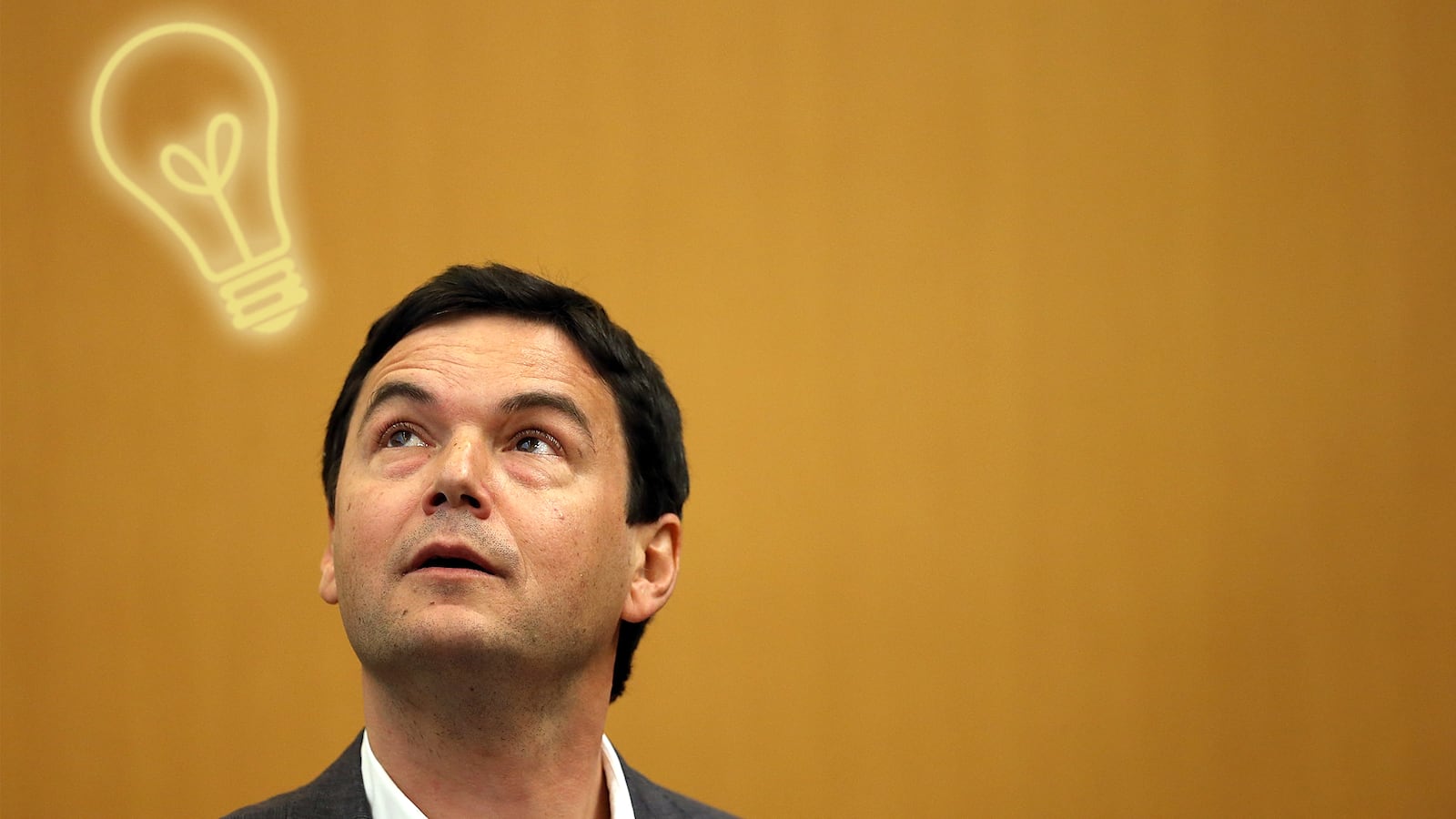2014 was, among other things, the year of Piketty—or even, as ironists said with arched eyebrows, the year of Pikettymania. The French economist’s evidence that economic inequality has been growing for 40 years, and for most of the last two centuries, captured a widespread sense that all is not well. Systems we were told would take care of themselves turn out to be self-undermining or self-immolating: global capitalism produces inequality and crisis, the industrial economy produces mass extinction and climate change. We read Thomas Piketty because we needed to understand these failures to have any hope of grappling with them.
Piketty, it turned out, was of limited help. His book, Capital in the Twenty-first Century, is an invaluable reconstruction of inequality from a wide range of sources, a triumph of the age of big data. But it does not say where economic inequality comes from: uneven bargaining power, political corruption, globalized labor and capital markets, the ineluctable progress of technology, or what? Piketty only waves his hands around the all-important question of whether economic inequality undermines democracy. He has nothing to say about how much inequality is too much, or which kinds of inequality are worst—in access to education, for instance, or health care, or political power? Without answers to these questions, Piketty’s work illuminated a vast landscape but left his readers with no compass to navigate it.
Fair enough. He’s already contributed more than most scholars do in a lifetime. But he opened more questions than he answered.
Spurred partly by this, I decided to spend this fall with the major works of thinkers who have asked the questions Piketty leaves unanswered. With a group of students from all parts of Duke, I re-read Adam Smith, John Stuart Mill, Karl Marx, Thomas Hobbes, Jean-Jacques Rousseau, Alexis de Tocqueville, and Friedrich Nietzsche. Writing over 250 years, these characters were watching the emergence of the modern state and the modern economy—what we know in shorthand today as democracy and capitalism. Our goal was to see what we could learn by approaching these old books with Piketty’s open questions in mind.
We knew that many academics today would consider our mission naïve. Scholars tend to shy away from our big questions, which they regard as imprecise and ahistorical—after all, Tocqueville meant something very different from us by “democracy,” let alone Thomas Hobbes, who was embroiled in England’s seventeenth-century civil war. Again, fair enough. But we were attempting a deliberate naiveté, a decision to approach these books as if they might have something to teach us. After all, we had questions that these authors were in some way addressing, and the alternatives were The New York Times op-ed page and The Economist.
What result? Well, there are plenty of nerdy zingers hidden in those thousands of pages. Adam Smith, patron saint of the free market, remarked that whenever bosses got together they immediately began conspiring against the public interest. John Stuart Mill, remembered mainly as a civil libertarian, concluded that even a failed attempt at communism would be better for workers than nineteenth-century capitalism. (He expected European capitalism to evolve spontaneously into a market socialism of worker-owned cooperatives.) Karl Marx already saw in 1867 that accelerating technological change would require training workers in flexible and adaptive skills rather than lifelong trades, something Thomas Friedman has recently been congratulating himself on discovering.
And there are more sobering bits of prophecy. Tocqueville, usually invoked as a cheery foreigner who admired Americans’ town meetings and civic organizations, was intensely pessimistic about the future of race in this country. He argued that racism against free blacks was worse than against enslaved people, because free blacks threatened whites’ race-based status. Marx forecast that the profit motive would lead to overworking and exhausting the fertility of our soil and other natural systems. Many today would say they were right on both points.
But these are only the little privileges of learning—poignant ironies, or the chance to attach a famous name to something you already believed. What else did we learn?
Two things stand out. First, before the mid-twentieth century—the period when, Piketty tells us, inequality anomalously fell and capitalism seemed to produce a fairly stable economic order of shared benefits—almost no one saw the market economy as a self-stabilizing, self-justifying system. Smith came closest, but he thought the market had to be justified in terms of the social relationships it created among people: if it didn’t make us more humane and more open to others, it might not be worth having. Mill found it unimaginable that future generations would treat working hard and getting rich as the point of life: he believed he lived in an unusually barbaric time of greed and narrow ambition. De Tocqueville thought that American democracy was at risk from what he called an “industrial aristocracy,” magnates who made their living from others’ labor but felt no social or civic tie to them.
And of course all of this leaves out Marx, who argued with force and brilliance that capitalism fell short of the enlightenment goals of personal autonomy and collective self-government. One of the pleasures of returning to this material is encountering Marx 25 years after the end of the Cold War, as a nineteenth-century thinker who stood on the left side of broad debate about the economy and politics, a man in dialogue with Mill and Smith, a journalist and admirer of Lincoln, and a participant in the turbulent working-class politics that would do so much to create the twentieth-century welfare state. The irony is that the welfare state humanized capitalism enough that, combined with the Cold War and a general turn to pessimism about political reform, it helped to euthanize the very ferment that had created it.
For all of these figures—meaning for serious people across the time when they wrote—economic and political life were the two great and inseparable problems. Each was a frontier of new human powers—technological mastery and growing wealth on the one hand; collective mobilization, self-government, and equal citizenship on the other. These powers could come into conflict: politics could dampen the economy, as Smith argued, or economic inequality could override the possibility of real democracy, as Marx insisted. The question they all asked, in different versions at different times, was how these great domains of change could be knitted together—and, the other side of the same coin, how they most gravely threatened each other.
The second lesson is that no one writing before the twentieth century holds a key to our problems. Our time is so vastly different in its particulars that the parallels work only in broad strokes. Neither Smith nor Marx can carry us far into the guts of globalized financial capitalism. Neither de Tocqueville nor Mill can sort out the prospects of democracy—or even the proper meaning of the term—in North Africa and the Middle East, China, or the European Union and the United States. How could they? When we can barely illuminate our own world, it would be superstitious to imagine that dead men could do it for us.
But these old works do invite us to live questions that they lived, which many of us had complacently forgotten, and which Pikettymania was an effort to remember. These are the inescapable questions of a world where the economy, including global ecology, does not take care of itself, and where it may come into conflict with democracy. They are questions for a world where we need to get clearer on what we mean by democracy, and what we lose when we neglect or betray it.
Pikettymania was a bleary awakening from a long sleep. Now half-awake, we need all the help we can get in understanding our situation. For me and some of my students, 2014 was the year of rediscovering old resources whose value is not exhausted yet.






